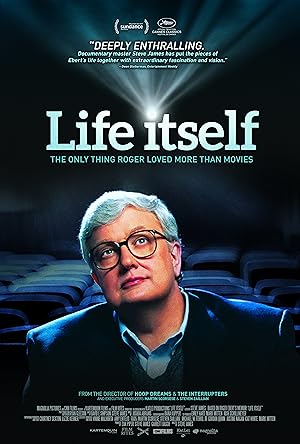
Life Itself
We all are born
with a certain package.
We are who we are.
Where we were born,
who we were born as,
how we were raised.
We're kind of
stuck inside that person...
...and the purpose of
civilization and growth,
is to be able to reach out
with other people.
And for me, the movies are like
a machine that generates empathy.
It lets you understand
a little bit more
about different hopes,
aspirations, dreams and fears.
It helps us
to identify with the people
who are sharing
this journey with us.
Exactly five months
before his death,
Roger and Chaz and I
met to plan
the beginning of an ambitious
schedule of filming,
including interviews
and critic screenings.
Roger mentioned in passing
that his hip was sore.
The very next day
he entered the hospital.
So now I got a
hairline fracture to the femur bone.
I didn't fall and have no idea
how it happened.
It's bloody painful.
This is my seventh time at rehab.
This table is weird.
I type much, much better
at home in my usual chair.
Show Steve the new chair.
It reclines.
He will see more of it.
So Roger, did you not pay
your insurance premiums,
and so you didn't get
the chair till now?
Steve, I'll do the jokes here.
This is Flora.
Also, this is Sonya Evans,
my stepdaughter.
I do what they tell me to do.
or work a little bit?
Steve is the director.
I'm just gonna sit down.
Although Roger had supported
my films over the years,
this film was the first chance
to really get to know him.
Steve, shoot yourself
in the mirror.
There he is.
Hi, Carol.
I'm Carol.
I'm Roger's assistant
for over 20 years,
Roger and Chaz.
And Zero Dark something
is winning all the awards, Roger.
It won another big award.
And the Bears lost.
"My daily..." What?
"briefing."
Okay, Roger.
And then Mayor Daley's,
you know, nephew
went to court today.
Remember, for the Koschman thing
that the Sun-Times
really uncovered...
I always worked
on newspapers.
There was a persistent need,
not only to write,
but to publish.
published the Washington Street News,
which I solemnly delivered
to neighbors in Urbana, Illinois,
as if it existed independently of me.
At the News Gazette,
a line-o-type operator
set my by-line in lead:
"By Roger Ebert."
I was electrified.
When I went home with it,
you could put your by-line
on everything.
My parents finally
had to take it away from me.
Everything was by Roger Ebert.
And I went to work full-time
for the local newspaper
when I was 15,
first as a sports writer,
general assignment,
working late,
being there with the newspapermen
back in the '50s.
It was unspeakably romantic.
I can write,
I just always could.
On the other hand,
In the spring of 1960, I announced
I wanted to go to Harvard,
like Jack Kennedy
and Thomas Wolfe.
"Boy, there's no money to send
you to Harvard," Daddy said.
of the University of Illinois:
to provide knowledge
for a better tomorrow.
I would go
to my hometown university.
I wouldn't be
an electrician like my father.
He told me one day
his father said to him,
"Roger, there's professors
over there,
that's what you oughta do some day.
You wanna sit there
with a pipe,
and a cardigan sweater
with your feet up on the desk."
early on that Roger had a gift.
and I ran into him then.
During my years at Illinois,
The Daily Illini than studying.
It was in every sense
a real newspaper,
published five days a week,
on an ancient Goss rotary press
that made the building tremble.
As editor,
I was a case study:
tactless, egotistical,
merciless, and a showboat.
And he was.
But it worked
because he could back it up.
It was intimidating
to the members of the staff
because he was like
a mature writer at that time.
Now here, when those
four children were killed
in the church bombing
in Birmingham,
there was a huge protest
around the country.
Four hundred students gathered
on the university quadrangle
to protest the bombing
of an Alabama Sunday school.
And Roger was the voice
of outrage on this campus.
He started off his column by quoting
who said to George Wallace,
"The blood of these innocent children
is on your hands."
That ended the quote.
by saying,
"That is not entirely the truth.
And it is not new blood.
It is old, very old.
And as Lady Macbeth discovered,
it will not ever wash away."
by a 21 -year-old guy,
and he said it better
than anybody said it all week.
Roger was editor
on November 22nd, 1963,
when John F. Kennedy was shot.
At around two o'clock
in the morning, the presses rolled,
gigantic presses,
two stories high,
chug and chug,
and Ebert was doing
what editors do
at the end of the day:
check out the pages.
And he opens it up and there's
a picture of John F. Kennedy,
and an ad of a pilgrim
with a musket
pointed at Kennedy's head.
Ebert said,
"We gotta switch this."
The pressman said like,
"Hear that sound, Roger?
That's the sound
of newspapers being printed."
Unlike in movies,
you didn't stop the presses.
And Ebert said,
"We're not gonna print that tomorrow.
We gotta stop the presses."
Ebert became famous
to us for that,
because, you know,
here was a kid
taking control
of an adult situation
and making a news judgment,
an important one.
Chicago was the great city
over the horizon.
We read Chicago's newspapers
and listened to its powerful
AM radio stations.
Good evening,
ladies and gentlemen,
it's midnight here in Chicago.
Long after midnight,
I listened to Jack Egan
broadcasting live.
Chez Lounge and
Chatting with Martin and
Lewis, or Rosemary Clooney.
I'd been accepted
as a PhD candidate in English
by the University of Chicago,
but I needed a job.
I got a part time job
at the Sun-Times,
and then five months later,
the film critic retired
and they gave me the job.
I did not apply for it.
Newspaper film critics
had been interchangeable.
Some papers had by-lines
that different people wrote under.
For example,
the Tribune had Mae Tinee,
and that could be whoever
went to the movies that day.
Because Mae Tinee really
spelled out "matinee."
I was at that time the youngest
daily film critic in America.
And it was a real good time
to be a movie critic.
Armed robbery.
Bet you wouldn't have the gumption
to use it.
Now, come here.
It is also
- Hey! What's your name, anyhow?
- Clyde Barrow.
Hi, I'm Bonnie Parker.
Pleased to meet you.
"The fact that the story
is set 35 years ago
doesn't mean a thing.
It had to be set sometime,
Roger was the most facile writer
I ever came across.
Anybody that has ever seen him work.
Translation
Translate and read this script in other languages:
Select another language:
- - Select -
- 简体中文 (Chinese - Simplified)
- 繁體中文 (Chinese - Traditional)
- Español (Spanish)
- Esperanto (Esperanto)
- 日本語 (Japanese)
- Português (Portuguese)
- Deutsch (German)
- العربية (Arabic)
- Français (French)
- Русский (Russian)
- ಕನ್ನಡ (Kannada)
- 한국어 (Korean)
- עברית (Hebrew)
- Gaeilge (Irish)
- Українська (Ukrainian)
- اردو (Urdu)
- Magyar (Hungarian)
- मानक हिन्दी (Hindi)
- Indonesia (Indonesian)
- Italiano (Italian)
- தமிழ் (Tamil)
- Türkçe (Turkish)
- తెలుగు (Telugu)
- ภาษาไทย (Thai)
- Tiếng Việt (Vietnamese)
- Čeština (Czech)
- Polski (Polish)
- Bahasa Indonesia (Indonesian)
- Românește (Romanian)
- Nederlands (Dutch)
- Ελληνικά (Greek)
- Latinum (Latin)
- Svenska (Swedish)
- Dansk (Danish)
- Suomi (Finnish)
- فارسی (Persian)
- ייִדיש (Yiddish)
- հայերեն (Armenian)
- Norsk (Norwegian)
- English (English)
Citation
Use the citation below to add this screenplay to your bibliography:
Style:MLAChicagoAPA
"Life Itself" Scripts.com. STANDS4 LLC, 2025. Web. 3 Mar. 2025. <https://www.scripts.com/script/life_itself_12550>.







Discuss this script with the community:
Report Comment
We're doing our best to make sure our content is useful, accurate and safe.
If by any chance you spot an inappropriate comment while navigating through our website please use this form to let us know, and we'll take care of it shortly.
Attachment
You need to be logged in to favorite.
Log In